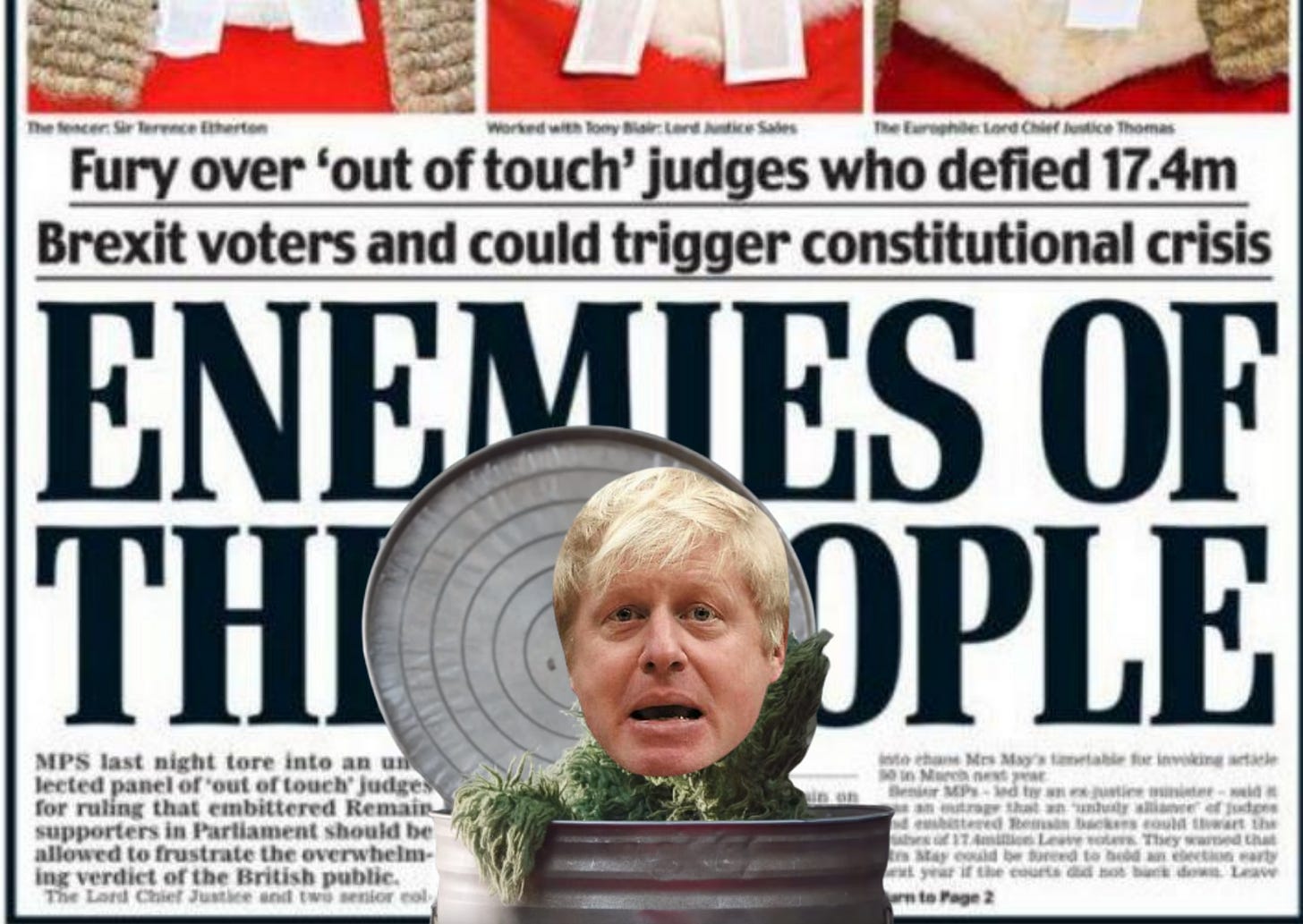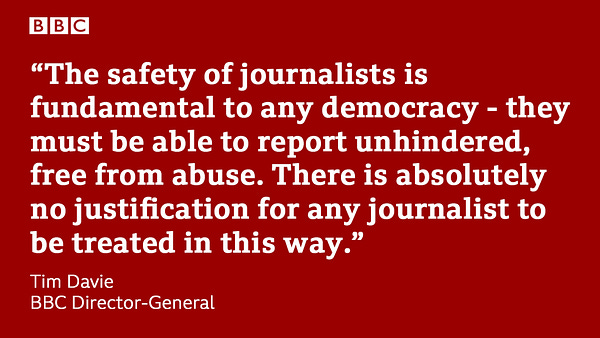Watt’s going on? The press that brought you “enemies of the people” is playing dumb about what happened to Nick Watt…
… and why trust in the media as a whole is somewhere south of the u-bend.
When Newsnight’s Nick Watt was chased, surrounded, and abused at by anti-lockdown protestors earlier this week — an event over which one man has been charged — there was a great deal of pearl clutching and tutting from other journalists about what it all ‘meant’. Of course, that analysis studiously avoided a dissection of the media’s own role in creating a climate where there are ‘heroes’ and ‘traitors’.
In a New Statesman article headlined The abuse of Nick Watt is no isolated incident – the UK media is under attack, Dominic Ponsford, editor of the Statesman’s stablemate Press Gazette, wrote:
The jostling and intimidation of the BBC Newsnight political editor Nick Watt is sadly only a small part of a much larger problem.
Watt was aggressively confronted by anti-lockdown protesters outside Downing Street on Tuesday (15 June), with footage showing people shouting “scum” and “traitor” at him. He ran behind the security barrier outside No 10, clearly in fear for his safety.
The mob could hardly have picked a more benign example of the fourth estate on which to vent their ire. You would struggle to find a more professional, sober and balanced journalist than Watt.
… There is now a significant minority of Britons who never pick up a newspaper, read a bona fide news website or watch a TV news bulletin. The proliferation of self-published online information sources is leading some into a new dark age where the advances of the Enlightenment are rolled back, and where they can instead choose whatever crackpot theory they wish to from an endless menu of deceit spread on social media and closed networks such as WhatsApp.
It’s a familiar line in the British press: It’s Twitter, Facebook pages, and closed WhatsApp groups that are leading to the growth of conspiracy theories and a more polarised and dangerous public debate. The role of newspapers and the broadcast media in seasoning this toxic soup is diminished or dismissed.
The Daily Mail’s ‘Enemies of the People’ front page is not mentioned in Ponsford’s piece, nor is its equally ominous entreaty that Theresa May “crush the saboteurs”. Columns by Jeremy Clarkson and Melanie Phillips were quoted by the mass killer Anders Behring Breivik in his 1,500 page manifesto. And only last month Matthew Parris was given a platform in The Times to argue for Gypsy, Romany and Traveller communities to have their ethnic minority status stripped from them.
Day in, day out, the comment sections of the British newspapers play host to views that are no less unhinged that the “self-published online information sources” that Ponsford rightly worries about. But columnists — the likes of Jan Moir who suffered no consequences for her vile insinuations about the death of Stephen Gately (an article that broke the Press Complaints Commissions’ record for most complaints received) and Rod Liddle whose catalogue of fact-free, abuse-filled utterances could fill several newsletters — have a far bigger reach and they are taken seriously.
Much is made of how many copies of The Guardian are purchased by the BBC, but it is clear from listening to Radio 4’s flagship news programme Today or watching BBC Breakfast that it is the news agenda of the Daily Mail that drives those shows’ running orders. And it is columnists, despite the newspapers’ falling circulations, that dominate the tone and tenor of public debate.
When Owen Jones was hounded by pro-Brexit protestors in January 2019 and later attacked outside a pub by a far-right extremist in August 2019, the number of media figures calling those events an attack on free-speech and a free-press — which they were — was far, far smaller. Watt is a pleasant, clubbable chap who Andrew Neil happily called a friend. Jones is one of the few columnists willing to take a stridently left-wing view and has often — rightly — criticised the media industry.
For presenters on GB News — including Andrew Neil — to lament the treatment of Watt is more than a little hypocritical. The channel exists as a right-wing riposte to the BBC and the promotional interviews in the run up to its launch were all about amplifying the existing line in the right-wing press that the corporation is full of out of touch, elitist, left-wing people who hate Britain. Remember that one?
Every day The Daily Mail, The Daily Telegraph and The Times carry stories that claim the BBC is not speaking for “real people” — whoever they might be — and indulging in every possible culture war angle. Back in March, those papers enjoyed themselves immensely during the ‘Union Flag row’, in which its was qwhite apparent why Naga Munchetty received far more hate and opprobrium than her co-host Charlie Stayt. As I wrote at the time for The Big Issue:
The latest ‘controversy’ — and I’m loath to use that word as the ‘outrage’ and ‘upset’ is largely a confection whipped up by right-wing commentators and columnists — illustrates just how thin-skinned those who obsess over ‘snowflakes’ truly are.
It’s hardly surprising that BBC presenter and current GB News hypeman Andrew Neil tweeted that, “Sometimes the BBC forgets what the first B stands for.” The storm in a (thoroughly British) teacup plays right into his rhetoric about the BBC being an out-of-touch hive of metropolitan leftie elitists, despite it having paid him handsomely for years to front its politics shows.
For the very same Andrew Neil to do his Edward R. Murrow act on GB News, turning the same ‘Media Watch’ slot he used to attack the BBC earlier in the week into a monologue about Watt and “the mob”, is hypocritical in the extreme.
Neil’s channel relies on stoking doubt and mistrust in the BBC while pretending to be entirely disconnected from the ‘mob’ which hears and understands its dog whistles. The crocodile tears dripped down his mahogany face like wet creosote on a fence.
In today’s Daily Mail, Florida-loving ‘patriot’ and perpetual hate-sponge Richard Littlejohn turns his ire towards Stonewall and Stop Funding Hate, calling them “protection rackets” and comparing them to the Kray Twins.
The Daily Mail — which exists to blackmail politicians and the public alike into agreeing with its views — calling anyone else a ‘protection racket’ is like Pablo Escobar chiding a street dealer for corrupting the youth. Littlejohn writes:
Today's social justice warriors will be horrified when I compare them to Ron and Reg. But their tactics are basically the same.
Outfits like Stop Funding Hate and Stonewall are running what are effectively protection rackets. Do as we say, or else.
The Twins used physical intimidation. The wokerati deploy more subtle, but equally menacing, ideological intimidation. Instead of pubs and nightclubs, the targets today are giant corporations and public institutions.
This is the old rhetorical trick of accusing your enemies of using exactly the tactics you employ. Littlejohn’s entire schtick is “ideological intimidation”. It’s what The Daily Mail does day in and day out, and its why James Slack, the author of the ‘Enemies of the People’ splash ended up in Downing Street as Head of Communications before recently slinking back to Fleet Street to apply his spin to the pages of The Sun.
Defying parody, Littlejohn writes “You couldn't make it up,” after his lengthy, partial, and distorted descriptions of Stonewall and Stop Funding Hate Campaigns. But Littlejohn can and does make it up. His paper presents its readers with a fairground mirror version of the world, in which anyone who doesn’t fall in line with the Daily Mail ideology is that very word the protestors chanted at Watt — a traitor.
Elsewhere in The Mail today, Jan Moir — another master of making it up — turns Waitrose relabelling a cooking ingredient into a creative writing prompt. She imagines that the decision to remove the word “kaffir” from packets of lime leaves is down to complaints from…
… someone called Binky who has a PhD in North Korean Studies, a Rebel Princess tattoo on her ankle and a dog on a string, even though her parents own most of Hampshire. Plus her friend Opal, affectionately known as Fruity in the Magdalen Middle Common Room.
… and goes on to imagine further name changes:
Before you know it shoppers will be objecting to curly parsley, black eyed peas, coarse salt, French sticks and fancies. Do Innocent Smoothies imply that other smoothies have guilt? And it cannot have escaped anyone’s attention that some potatoes are marketed as ‘loose’, tuber-shamed with this implication of low morality. Other potatoes are ‘sweet’, some ‘all-rounders’ and some get mashed. Who are we to judge? It’s the same with virgin olive oil and extra virgin oil.
Someone told Jan Moir that she was funny once and unfortunately she believed them.
Things like Moir’s column can be seen in isolation as pathetic foot-stomping by outrage-mongers whose living depends on them finding something to anger them at least once a week. But this stuff contributes to how public debate functions in Britain, a climate where things that don’t matter are debated endlessly and turned into loyalty tests, while things that matter a great deal don’t even make it into the conversation.
While the treatment meted out to Watt by the protestors was rightly deplored, the same figures who were furious on his behalf were utterly silent when a journalist was publicly attacked by a government minister. And have studiously ignored comments from Boris Johnson’s former race Samuel Kasumu, who specifically mentioned Kemi Badenoch, the equalities minister, using Twitter to accused a young, black journalist — Nadine White, then of HuffPost — of being “creepy and bizarre” simply for doing her job and asking the minister questions.
White received torrents of abuse as a result of Badenoch’s intervention — which appeared to be a breach of the Ministerial Code — and an alert about the risk to media freedom was registered with the Council of Europe. Kasumu told The Guardian:
There’s an assumption that I have issues with Kemi. I don’t have any personal issues with her. But when that happened, a lot of things went through my mind. I thought to myself, if that young journalist was my sister, or a relative of mine, how would I feel about a minister responding to her in such a way?
I thought, if the journalist was Andrew Neil, or Laura Kuenssberg, or Robert Peston, would the minister have responded in the same way? Were the minister’s actions distracting people from very important public health messages? It just led me to the conclusion that it was completely unacceptable.
Les Bright, a correspondent to The Guardian’s Letters page yesterday noted:
Kasumu provides substance to support the view that there are more stokers in the cabinet than in a ship’s crew. And for those who remain to be convinced by Kasumu’s analysis, the pursuit of a journalist by a baying mob calling him a ‘traitor’ may be a good starting point.
Of course Johnson — whose own career as a journalist is as littered with lies as his time in politics — condemned the treatment of Watt, but his words are as empty as his attempts to dismiss and distract from the infamous occasion when he agreed to conspire with his friend, the convicted fraudster Darius Guppy, to have a journalist beaten up for the egregious offence of looking into Guppy’s dodgy dealings.

Johnson writes that “the media must be able to report the fact without fear or favour,” but as I have covered extensively in the past his own career as a hack was focused on confecting fiction for favour. He has continued that practice in government.
Dominic Ponsford ends his New Statesman piece with a call for greater regulation of social media companies and a glancing reference to the phone hacking scandal:
The public perception of journalism was undoubtedly harmed by the small minority who engaged in criminal hacking of mobile phones at the News of the World and Mirror titles in the 2000s. But something else is at play here: a nasty side to human nature, which has been given an outlet by unregulated social media.
The long-term answer is probably greater regulation of tech companies, to make them responsible for the bile published on their platforms by anonymous trolls. In the meantime, we must continue clamping down on the spread of dangerous conspiracy theories on open and closed digital networks that fuel the delusional hatred that was on display against Watt in Whitehall.
While phone hacking played some role in distrust of the media, I don’t think it’s even remotely the biggest issue. Leveson is still talked about by media commentators and industry watchers but it’s a dim and distant memory for most people. The daily parade of hyperactive, exaggerated and empty stories on the front of the newspapers is far more influential in making people doubt journalists.
The idea that lies, distortions, and conspiracy theories are simply the preserve of the internet’s most squalid corners is farcical. The British media — especially its newspapers — has failed time and time again in the past few years (and for much longer than that) to tell stories honestly. When the country’s most famous political correspondents frequently act as stenographers and unpaid spokespeople for the government, the distrust that causes trickles down to all levels of journalism.

Is that fair towards hacks who are actually honest and report properly? No. Does it mean that everyone in journalism is rotten or acting in bad faith? Obviously not. But to look at the people who pursued Watt and conclude that the culture of debate fostered and fomented by the newspapers and amplified by broadcasters plays no role in who they think are “traitors” is deliberately ignorant.
Politicians and the media alike frequently harness the very anger that they dismiss as “the mob” when its not convenient to them. When it turns on someone they consider ‘acceptable’, they’ll shove out a condemnation, but the rest of the time they’ll look the other way and keep their mouths shut.









Hey Mic, I don’t comment as much as I should because your column is brilliant. Just dropping by to say thank you for doing what you do, and articulating WHY I feel such rage at the way our media often is. It’s depressing and hopeful in equal measure. Keep it up.